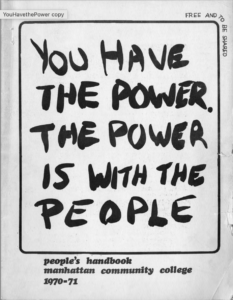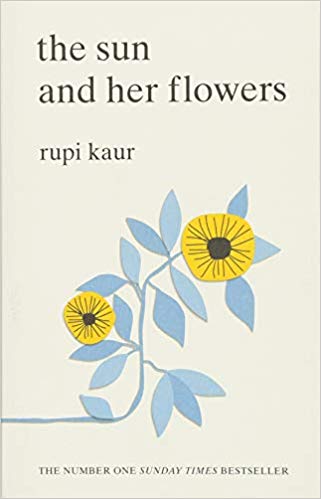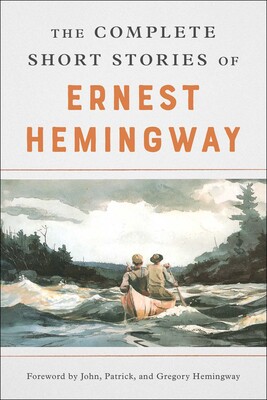What can we say that we have accomplished as students in the digital age, and what does it mean to feel powerful or powerless in the future?
 I am a part of Generation Z. This is my background as I read “You Have The Power. The Power is With The People.” It was written 53 years ago by students at BMCC in the same position as you and me. Their echoes reflect common revolutionary rhetoric, complete with comic book humor and textbook slurs for lack of creative effect. The text dives deep into the dystopian nuance of the academic industrial complex and relentlessly chooses to entertain a perspective of misfortune. The message is clear: Fight like hell or succumb to the powers that be. This undercurrents every page. Page 25 says, “The less money you have, the less care you get.” I disagree.
I am a part of Generation Z. This is my background as I read “You Have The Power. The Power is With The People.” It was written 53 years ago by students at BMCC in the same position as you and me. Their echoes reflect common revolutionary rhetoric, complete with comic book humor and textbook slurs for lack of creative effect. The text dives deep into the dystopian nuance of the academic industrial complex and relentlessly chooses to entertain a perspective of misfortune. The message is clear: Fight like hell or succumb to the powers that be. This undercurrents every page. Page 25 says, “The less money you have, the less care you get.” I disagree.
Seventies babies were possessed with revolution. Generally speaking, I admire ‘the wave’ and the ambition of flower children, but the media purported a movement that lacked the discipline required to subvert the rhetoric of capitalism. As I try to grapple with the climate of the youth political sphere at the time when this magazine was written, instead of feeling inspired, I feel gripped with the need to repudiate such harsh opinions. I have done as much introspection about society at around the same age as these students, but have come to a different conclusion. The text asked many questions, such as where is power or who has power, but it neglects to ask what power actually is and deflects the true nature of agency and its birthing place. The themes brought forth in the text require critical examination from a contemporary perspective to see that our relationship with power has actually not changed over time, or arguably is not getting any worse. Contrary to this text, which rarely reads more than oppressionist propaganda, power is a unique and organic structure. The text neglects to demystify the individualistic quality of revolutionary practice, which is a prerequisite to local and global coalition.
There is an alternative theoretical playground that enfolds the working student and eats away at the neglect, abuse, and overwork of the proletariat. The incredible vivacious spirit of youth remains unchanged not because of revolution but because of the personal reckoning with the nature of work. Agency in choice and perspective is of a foremost metaphysical quality, but it is the basis of praxis. Oppression and prejudice are theoretical infrastructures that happen to affect our lives in a material and socioeconomic sense, but the alternative psycho affective and emotional reality speaks volumes. What of the student who embraces work, recreation, and social relation to others from a poetic perspective? What of the working woman who does not think of time or money as obstacles? The contemporary wage laborer has to make the same choice as the slave, the farmer, and the peasant. Why would one dream of yachts or ubering food when I know those who are endowed with riches can be miserable? The fables are true, and I can look them up on the internet. There are countless stories of struggle and survival on the expanse of the digital space and anyone can learn from them. The tortoise does in fact win the race. Jesus, Himself, was a manual laborer (Mark 6:3). Sisyphus must push the stone up the hill. “You Have the Power” frequents a desperate mentality that pacifies the parts of us that call to mind the goodness of life, which is the most creative in times of frustration. I rebuke anarchist thought without room for utopian interventions within a political context. As a default emotional condition, anarchy can be destructive. This text does not consider the lessons of toil, which is the fruit of critical analysis within the paradox of suffering.
To me, to live in the future means to live with the wealth of the mind. It means to deal in the technology of the spirit, regardless of industrial complexes. In 2025, I choose time, I choose love, and I choose abundance. The text makes it seem like abundance is only possible through coalition, but coalition with others is impossible without a reckoning with emotional and cognitive efficiency. I encourage my fellow peers to read in between the lines and then read in between those lines. Call up your brain cells and have a conference! Instead of overthrowing the government, try overthrowing the trauma clouding your neurological capacities from enjoying a cup of coffee. “You Have the Power. The Power is With the People!” is still worth a read, but read closely.
Get the zine! Come to BMCC’s library and find “You Have The Power. The Power is With The People” in our zine library! We have copies of this zine that you can take home, and we also often give them away at tabling events just outside the library. Or, you can read this zine right now and download your own copy from the CUNY Digital History Archive.

About the author Rain Marie Robertson is a Literacy Studies Major at BMCC. Hailing from Atlanta, GA, she is often seen around her neighborhood in Harlem and enjoying matcha lattes in Meatpacking (at her other job).

This work is licensed under a Creative Commons Attribution-ShareAlike 4.0 International License.




